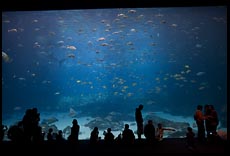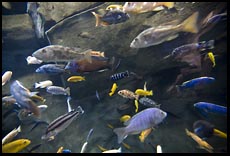

|
Fishpart of "A Rich Person's Guide to Aquariums" by Philip Greenspun |
If you have no idea what kind of tank you'd like to set up, it is worth leafing through The Complete Aquarium (Peter Scott; DK). This book offers reasonable practical advice for and excellent photography of almost every kind of home aquarium: saltwater fish, saltwater reef, African cichlid, South American freshwater, Asian freshwater, etc.
 If you're sentimental about animals and don't like to see them die,
saltwater is probably not the best place to start. However, if you do
choose to go the saltwater route and want to minimize your effect on the
environment, there are an increasing number of companies that are
breeding marine fish and coral in captivity. Examples of such
If you're sentimental about animals and don't like to see them die,
saltwater is probably not the best place to start. However, if you do
choose to go the saltwater route and want to minimize your effect on the
environment, there are an increasing number of companies that are
breeding marine fish and coral in captivity. Examples of such
What's the problem with wild-caught reef animals? In third-world countries such as the Philippines and Indonesia, commercial collectors use cyanide to stun the fish and make them easy to capture. This cyanide poisoning causes a lot of collateral damage and the fish that you take home today may die three or four months from now from the residual cyanide. It is conceivable that the industry will evolve mechanisms for ensuring that animals sold in the US were collected in an environmentally friendly way. But until then the best way to feel good about your saltwater tank is to go captive-raised.
Maintaining a saltwater fish tank involves a fair amount of work during the first six months but after that it can be nearly as simple to maintain as a freshwater tank. Reef tanks are in some ways tougher due to their requirement for powerful lighting but the ecology of a reef tank tends to be more self-sustaining with Animal A consuming the waste products of Animal B.
 Here's part of a review that I wrote of
The
Cichlid Fishes by George W. Barlow:
Here's part of a review that I wrote of
The
Cichlid Fishes by George W. Barlow:
You've got to love a U.C. Berkeley professor who quotes from the AP wire to reinforce the difference between soft-rayed and spiny-rayed fish:Cichlids are interesting. Cichlids are often colorful and beautiful. Cichlids are hardy and tolerate a wide range of water chemistry. Cichlids are intelligent and have personality. If you're one of the people who feed them, at a minimum they'll greet you by swimming to the front of the tank when you walk into the room. Why don't 10-year-old aquarists end up with cichlids? Cichlids tend to get large, at least 4 or 5 inches long and some species more than 12 inches. Cichlids thus require large tanks. More disturbingly, cichlids can be aggressive toward each other. Breeding pairs in particular will stake out territory within the tank and fight off other fish who approach. Males will fight for females.... when I read the headline to an article in ... the San Francisco Chronicle (1 April 1997), I knew both it was not an April Fool's Day joke and that the fish was most likely a cichlid, and it was.Cichlids are freshwater fish that provide parental care for their children. They are among the most intelligent of fish. Among the thousands of species of cichlids, it is possible to find behavior that is familiar to students of human psychology. There are cichlid fathers that stay with the wife and kids when times are tough but desert to find a new mate if predation levels are low enough that the female and his offspring by her can survive on their own (cf. American ghetto life after Aid to Families with Dependent Children).
Man Chokes on Tropical Fish Bayou Visa, La. Stephen Hill Epperson, 36, popped a friend's 6-inch tropical fish into his mouth as a joke Sunday and died when it got stuck in his throat. The Jack Dempsey fish became wedged in Epperson's airway, said Dr. F.H. Metz, coroner for St. Mary Parish.The Jack Dempsey is indeed a cichlid and performed the typical response of a spiny-rayed fish when engulfed by a predator: It locked its fine spines in the upright position to thwart being swallowed. Had the fish been a soft-rayed fish, such as the goldfish that have so often been safely gulped down by college students, the unfortunate Mr. Epperson would still be alive.
When setting up a cichlid tank you ought to choose South American or African. The South Americans, of which the best known example is the Oscar, prefer soft water with a pH near neutral. The Africans come from hard water with a high pH (between 8 and 9, depending on the lake). My personal favorites are the Africans and my favorite book is Cichlids and All the Other Fishes of Lake Tanganyika by Pierre Brichard, a biologist who devoted his life to understanding these animals. Lake Malawi is an even more popular source of cichlids than Lake Tanganyika, so you really need Cichlids and All the Other Fishes of Lake Malawi by the somewhat less colorful Ad Konings. If you can make contact with some members of The American Cichlid Association, these folks can guide you in the right directions.
An interesting sub-obsession within the cichlid community is with the South American Discus. These are round fish that grow up to 10 inches in diameter and have been bred in a wide variety of colors and patterns. Discus are interesting when breeding because they nurture their young with a special slime secreted from their skin. Check the Discus-L homepage for more info.
Not all Cichlids grow large - there are dwarf ones that grow to only 1-2" long, South American and African. They also have the advantage of being mixable in community tanks, as long as you have faster fish in with them. See some examples including Pseudos and Rams at http://www.cadvision.com/fuhrmanr/fish/fish.htm to see what I'm talking about. Some will even breed for you should be fortunate enough to provide them with the right conditions.I agree that they are one of the most interesting classes of fresh water fish. Not too hard to take care of either, but, one of the more expensive fish, for sure.
-- Ralph Fuhrmann, January 5, 2002
I especially agree with the comments regarding cichlid intelligence and personality!!! (and thank you for including the name links, a very imporant aspect often not mentioned)
-- London Back, March 21, 2002
I have 2 Oscars. They are the greatest fish out there. My female's name is Rosie and my male is Bob. They live in seperate tanks because they did not pair up when they were younger. I love them alot. I have 5 fish tanks total in my house. And can you believe I want more?
-- Sandra Morris, December 2, 2006